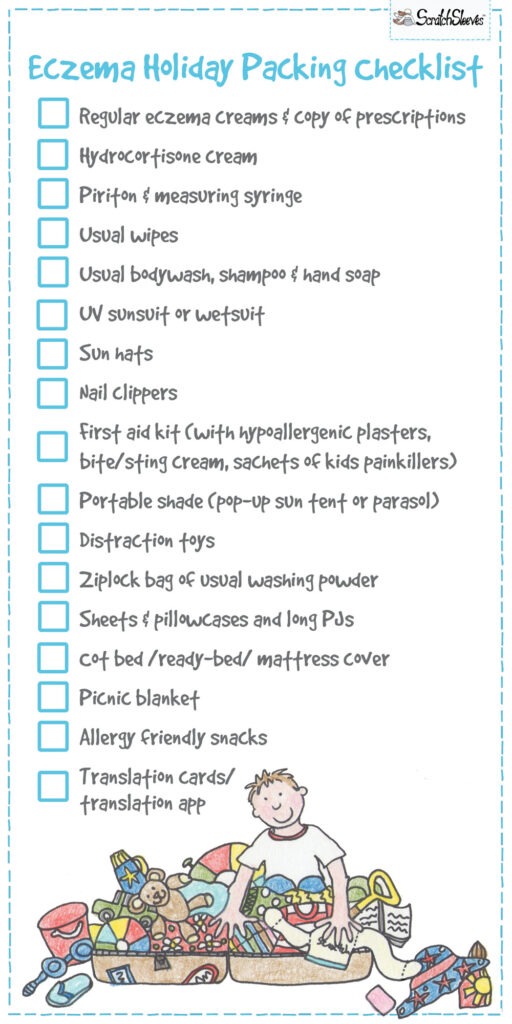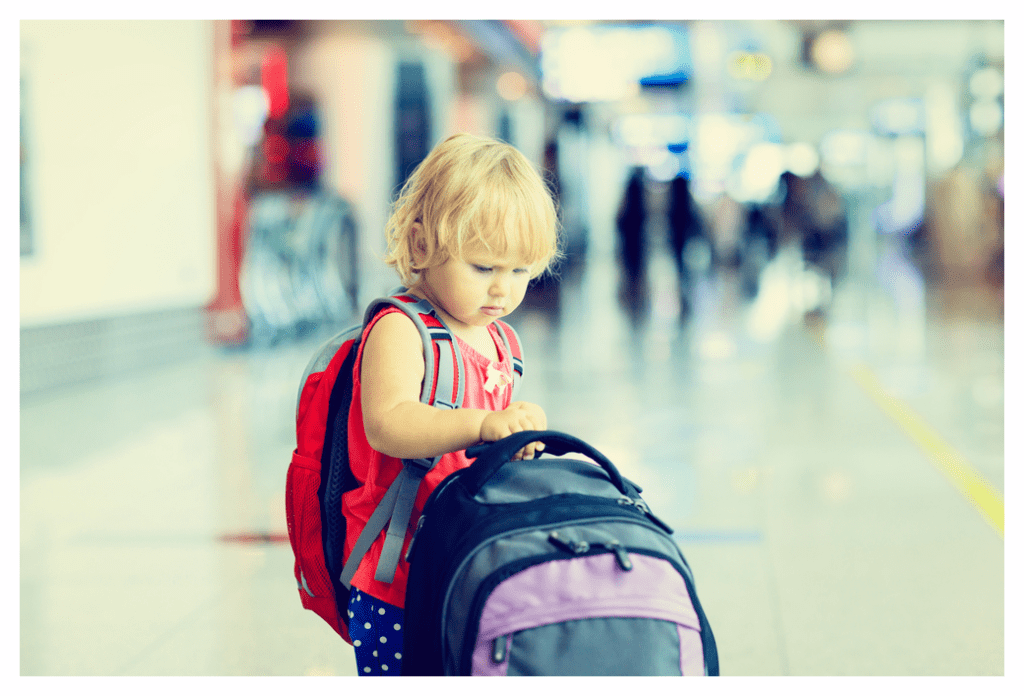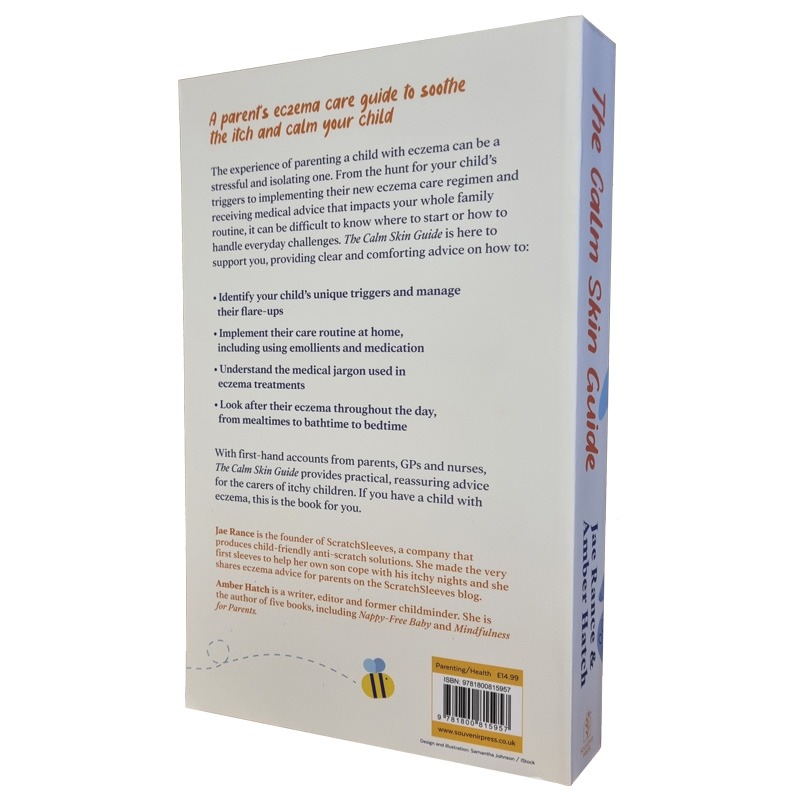Going on holiday? Top tips for managing baby and childhood eczema while you’re away



Over the years we’ve learned that a successful family holiday all boils down to planning and preparation. It’s hard work though. Just thinking about the kit that everyone in our little clan needs for a fortnight away is enough to put me in a bad mood. Inevitably I can’t find the favourite swim suit or the bag of hand-me-down summer clothes are crumpled beyond recognition and require a military effort of washing and ironing. And then, of course, there’s the holiday eczema ‘kit’ which we need to take. It’s all enough to make me think, is it really worth it? Of course, it always is.
In this article, we thought it would be helpful to share advice and information which has helped us to prepare to deal with our children’s eczema while on holiday. Being prepared before you go certainly helps to keep eczema in check so the children can just get on with having fun. But also it will help you to have a good time too. No one wants to spend a holiday trying to find a chemist or getting an appointment with a doctor.
You’re probably only too well aware that heat, sweat, chlorine, sea salt and sun creams all have the potential to wreak havoc with your child’s eczema. As well as preparing for nasty flare-ups while you’re away from home, you’ll need to know what liquid emollients you can take on your flight and how to access healthcare while abroad. Hopefully, here we can answer your essential eczema holiday questions.
Before you go
Put a reminder on your calendar to order any repeat prescriptions a couple of weeks before you’re due to go to ensure you don’t leave it until the last minute, there’s enough to do in packing for a family holiday without this added hassle.
Extremes of temperature are known to aggravate eczema so if you’re going somewhere hot it will pay to plan ahead. Check our article on helping an eczema child sleep on hot summer nights for ideas before you go. Because hot nights can be a particular problem for babies and young children with eczema you may need to consider being prepared for wet wrapping. This involves dressing your child in old clothes which have been soaked in water with a dry layer over the top and then re-applying when the wet layer dries out. Before trying wet wrapping you should speak to your doctor or health visitor, but it’s certainly worth exploring before you go on holiday, just in case.
Some travel vaccinations can aggravate eczema so get them done early to give plenty of time to get any resulting flare-up under control. You can find out more here.
What to pack
What you need to pack will depend in part on what aggravates your child’s eczema. If laundry detergents are a trigger, you’ll need to take long PJs or your own sheets and pillowcases; if toiletries cause a problem, pack your usual brand (remembering the hand soap) and steer well clear of any complimentary shampoo or shower gel; if it’s house dust mites, take a travel cot, ReadyBed or mite proof mattress cover for sleeping and a picnic blanket for your little one to play on. Our packing checklist will help to make sure you’ve got the essentials.
If your little one has food allergies make sure you have plenty of allergy-friendly snacks, just in case your planned meals don’t work out or you are delayed somewhere. Translation cards for eating out and emergencies can also be really helpful and give peace of mind. BrokerFish has a good selection of free downloads and AllergyUK has a range of plastic cards to purchase. Alternatively, download a translation app onto your phone, but do make sure it will work without a mobile or wifi signal.
Creams and emollients
You’ll also need to ensure you’ve got enough of your child’s normal emollient and eczema treatments to see you through the holiday and beyond as you may find you need to use more than normal. Even if you don’t normally use it, taking a tube of steroid cream will mean that you have some available to treat any particularly nasty flare-ups quickly. Your GP will be able to prescribe some or 1% hydrocortisone is available over the counter. It is also a good idea to pack a copy of your child’s prescriptions, just in case you need to speak to a chemist or doctor while abroad. But be aware that many eczema creams are not available abroad and it may also be hard to find equivalents. This is especially true of emollients – here in the UK, we have a far wider range than in many other countries.
You won’t need us to tell you that eczema creams are messy and can be difficult to wash out of clothing. Or that your luggage is likely to be pummelled on the journey. Putting tubs and tubes of cream in heavy-duty, re-sealable bags will reduce the risk of any leaks spoiling your holiday clothes. And remember to push down and lock the plungers of any pump dispensers.

You can download our printable packing list here.
Holiday clothes
While it can be tempting to invest in a funky holiday wardrobe for your little one – remember to stick to the basics of loose cotton clothing, removing the labels and avoiding stitched on motifs and trims with scratchy undersides. Long sleeves can reduce the need for sun-block and also protect itchy skin from scratching. If you are taking new clothes, wash them before you pack to make sure that any chemical residues from the production process have been removed.
On the way

Whether you’re driving or flying, it’s worth having some emollient to hand in case you need to apply it during your journey. The low humidity of aircraft can dry skin very quickly so be prepared to apply emollient mid-flight and make sure that your little one drinks frequently.
If you’re flying, remember you will only be able to take liquids or creams in containers of up to 100ml (3.4oz) in your hand luggage. If your brand isn’t available in smaller tubes it’s worth checking with your airline as some do allow larger quantities of liquid if they’re accompanied by a doctor’s letter. However, the quickest and simplest solution is to dispense some emollient into a small plastic container which you can buy from chemists such as Boots or Amazon.
Applying emollient in the confines of an aeroplane seat can be challenging. We found that a little-and-often approach combined with a good supply of muslin squares kept the grease contained. If your little one is prone to itching in dry environments (e.g. when the central heating is on) consider taking a small bottle of Children’s Piriton and dosing syringe in your hand luggage.
Travelling can be really dull for children and boredom often ends in scratching. Be sure to have plenty of distractions ready to take their minds off any itching and to keep scratchy hands busy. We load up our tablets with CBeebies downloads and take a couple of new (to them) books or toys to produce along the way. Having a set of ScratchSleeves handy will help minimise the damage if the urge to scratch to too great.
While you’re there
It goes without saying that you’ll be aiming to stick to your usual skincare routine while you’re away, but be prepared to be flexible and think laterally. On one holiday, when our eczema boy was a toddler, we belatedly realised that the cottage we had booked only had a shower – which he hated. He was way too big for the sink – our solution on a previous trip. It was a Sunday in Cornwall so buying a baby bath wasn’t an option. We ended up using the flexi tub we had used to pack his toys in as a bath – which he loved.
It can be tempting to go easy on the emollient, especially if your little one has a tendency to spread their cream over the walls and furniture. Resist the temptation. Protect soft furnishing with towels and have plenty of wipes ready to clean up the inevitable smears quickly. Older children can be really helpful in this. If it’s warm and there aren’t any biting insects about, you could consider applying creams outside. We have ended up applying emollient on the terrace before now – sun loungers are wipe clean!
In the sun
A summer holiday might be just the thing your child with eczema needs as sunshine is great for producing skin-loving vitamin D. That said, eczema can be aggravated by hot weather so if you’re having a day on the beach or by the pool it’s important to make sure you’ve got access to shade. If you think there’s a chance you won’t get a parasol make sure you pack a pop-up sun tent so you’ve got shade when you need it.
You’ll also need to ensure you find a sunscreen which doesn’t interfere with eczema before you go – it can be trial and error to find a brand which suits your child. Our guide to sunscreens and eczema is a good place to start.
On the beach
A golden sandy beach can act as a wonderfully effective exfoliant on dry, flaky skin. However, it’s deeply unpleasant to get sand mixed up with sunscreen when applying it to sore or itchy skin. Try to get into the habit of applying sunscreen before you set off for the beach and choose one which is long-lasting so you don’t have to re-apply so often. If you do need to use sunscreen while on the beach, rinse off the sand with fresh water and pat with a clean towel first. You’ll find more top tips for taking an eczema child to the beach here.
In the water
Sea water is great for treating eczema, it has a proven soothing effect and acts as a natural moisturiser and antiseptic. If the skin is broken, try applying a layer of Vaseline to reduce the initial sting, which can be nasty.
If you’re spending a lot of time in a chlorinated pool, your child’s usual emollient can also be a helpful barrier. Just be aware that they will be slippery if need to make a quick grab for them. Long sleeves rash vests can help with this. Go for a slightly larger size so you can get it on over the emollient. Also, make sure you have plenty of emollients to put on at the end of the day as you could find your child’s skin gets dried out through continual immersion in the water.
Accessing healthcare while abroad
By planning ahead hopefully, you will avoid having to use medical services while on holiday. However, in the hustle and bustle of packing for your holiday, it’s always possible to forget your child’s emollient, or a nasty flare-up can leave you worried and in need of medical advice. Again, being prepared is always the best option. Check your travel insurance policy for medical treatment in the country you are visiting before you leave and make sure you have cover for these medical costs.
To find out what healthcare arrangements are available when travelling abroad, the Foreign and Commonwealth Office website is very useful. Go to the ‘Travel Advice’ section of the country you are going to visit to find information on whether you’ll be expected to pay for healthcare services, or whether they’re provided free of charge or at a reduced cost to British nationals.
Have a great holiday!
As well as sharing our experience of bringing up an eczema child (and favourite allergy-friendly recipes), ScratchSleeves also manufacture and sell our unique stay-on scratch mitts and PJs for itchy babies, toddlers and children. We now stock sizes from 0-adult in a range of colours. Visit our webshop for more information.
The Calm Skin Guide
Love our blog? It's also available in book format with:
- First hand accounts from parents & medical professionals
- Easy navigation
- Comprehensive index
- Additional material
Signed copies available at no extra cost
Written by:
Interesting article? Don't keep it to yourself...
Read next...
You may also find helpful...
Quick buy


Multi Buy Discount

Spend between £30 - £60 and save 5%
Spend between £60 - £120 and save 10%
Spend over £120 and save 15%
Discount automatically applied at checkout
No Quibbles Guarantee

ScratchSleeves abide by a no quibbles guarantee.
Free UK Postage

Free packing and postage on all UK orders. For overseas orders to Europe postage is from £3.50, to USA is £6.50 and to the rest of the world, from £3.75.






